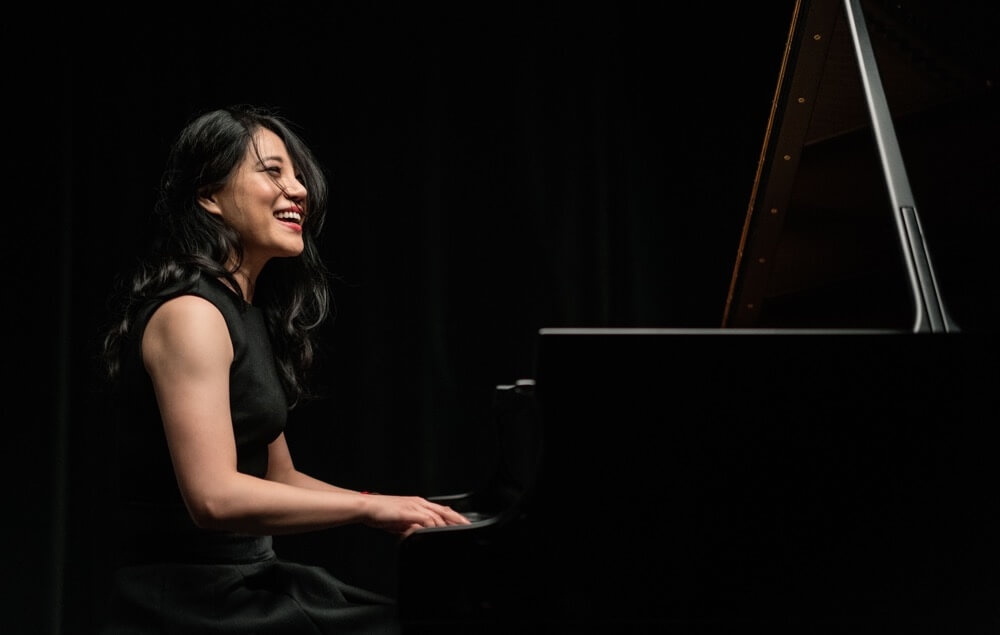The Gilmore Keyboard Festival’s Rising Stars series continued on Sunday evening with a stellar performance by Zhang Zuo, also known as “Zee Zee,” at the Wellspring Theater in Kalamazoo. Rising Stars seeks to offer a chance to see promising performers before their international breakthroughs, and if the audience learned anything from Zuo’s performance, it’s that she’s definitely one to keep an eye on.
Zuo played a 90-minute program that was a bit different than originally planned, beginning the night with Bach’s Partita No. 1 in B-flat Major, BWV 825; followed by Faschingsschwank aus Wien, Op. 26 (Carnaval of Vienna). After a 15-minute intermission, Zuo returned to perform Ravel’s Gaspard de la nuit and Lizst’s Rhapsodie espagnole, S. 254 before treating the audience to a brief and beautiful encore of a Chinese folk song.
The first half of the program was decidedly jovial and pretty. Zuo’s interpretation of the Bach Partita delighted the audience as she gracefully moved from upbeat, lyrical sections to quiet, romantic ones and back again. The emotion of her playing was mirrored on her face throughout the performance, but especially so in the Sarabande, the slow, stately fourth movement of the Partita; Zuo’s intense look of longing belied the serious measure and control she held over the keys throughout the entire movement.
The Schumann selection began equally as softly and romantically as the piece that preceded it, but quickly became dramatic and intense thanks to Zuo’s energy and body language. The piece became more and more complex as it drew on, and the performer tackled even the most technically challenging sections in the Scherzino and the Finale with ease. She finished the piece with a flourish of her arm, a humble smile and chuckle, and more than a few bows of gratitude toward the audience.
After the intermission, Zuo returned to the keyboard and changed the tone completely for the rest of the performance. Ravel’s Gaspard de la nuit, a notoriously difficult piano suite inspired by three dark poems by Aloysius Bertrand, showcased a completely different facet of Zuo’s taste and skills than the Bach or Schumann. Her interpretation was frantic, at times unsettling, and evocative of the tales of mischief and terror that inspired the piece.
Zuo finished the program with Liszt’s Rhapsodie espagnole and absolutely did the composer proud with playing that was so precise and so quick that, at times, her hands were literally invisible to the audience. The piece’s tango-like rhythm and dark, sprawling melodies were offset by glittering arpeggios on the high end of the keyboard, and Zuo had clearly mastered both. She finished the piece with yet another arc of her arm and a beaming smile, and she received a standing ovation from the crowd before exiting the stage.
Zuo returned to the stage and expressed her gratitude for the audience and her excitement to be in Kalamazoo before beginning her encore, which she introduced as a Chinese folk song very dear to her heart.
“It means a lot to me, so I hope you enjoy it,” she added, before returning to the bench for an absolutely gorgeous rendition of Liu Yang River, a modern Chinese folk song for piano. The piece was quiet, sentimental, and all-too-brief, giving the audience yet another glimpse of the reserved, measured intensity that Zuo brought to the entire program.
It’s clear that Zuo is one to watch in the world of classical piano. Her program spanned from pretty and light to darkly intense, and the composure and grace with which she executed even the most daunting movements is unparalleled yet this season. Her Gilmore Rising Stars performance was an absolute delight, and a performance that will undoubtedly linger in the minds of anyone who was lucky enough to catch it.
Zhang Zuo
Gilmore Keyboard Festival
April 14
Watch the replay at: thegilmore.org





